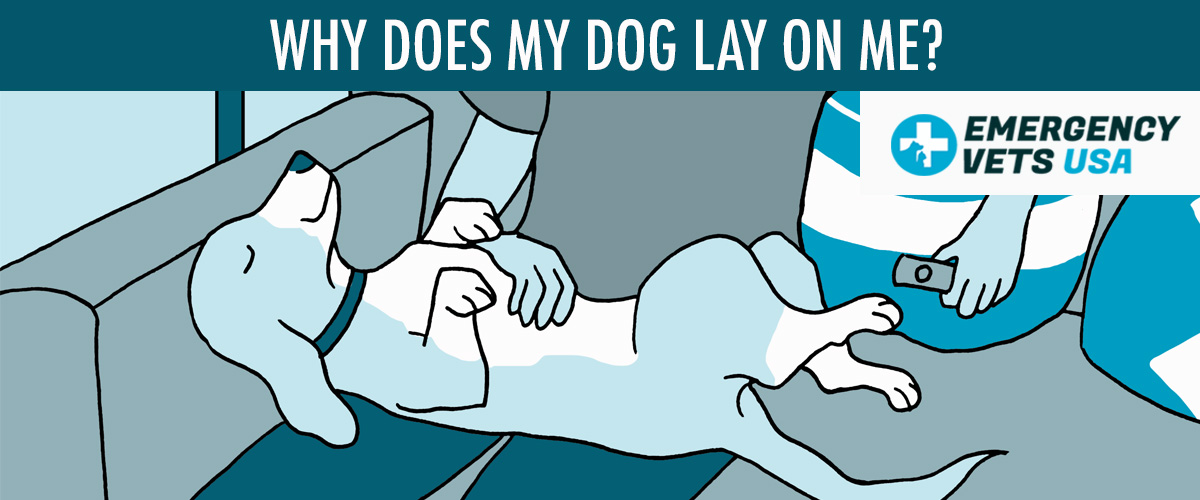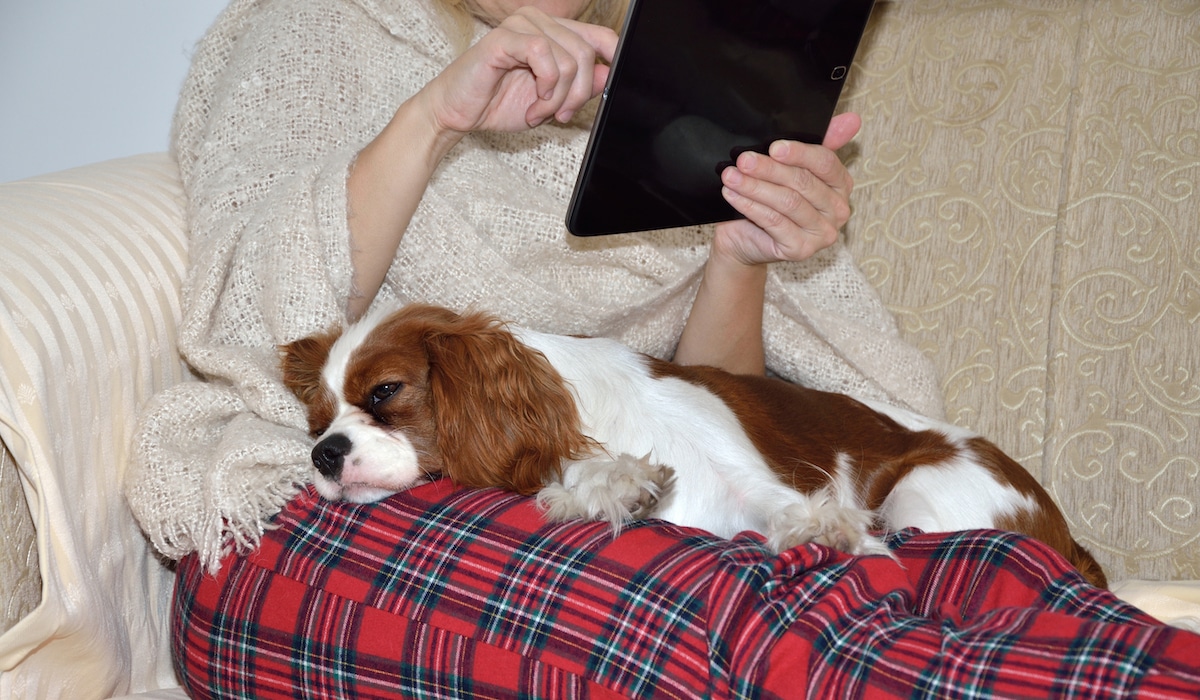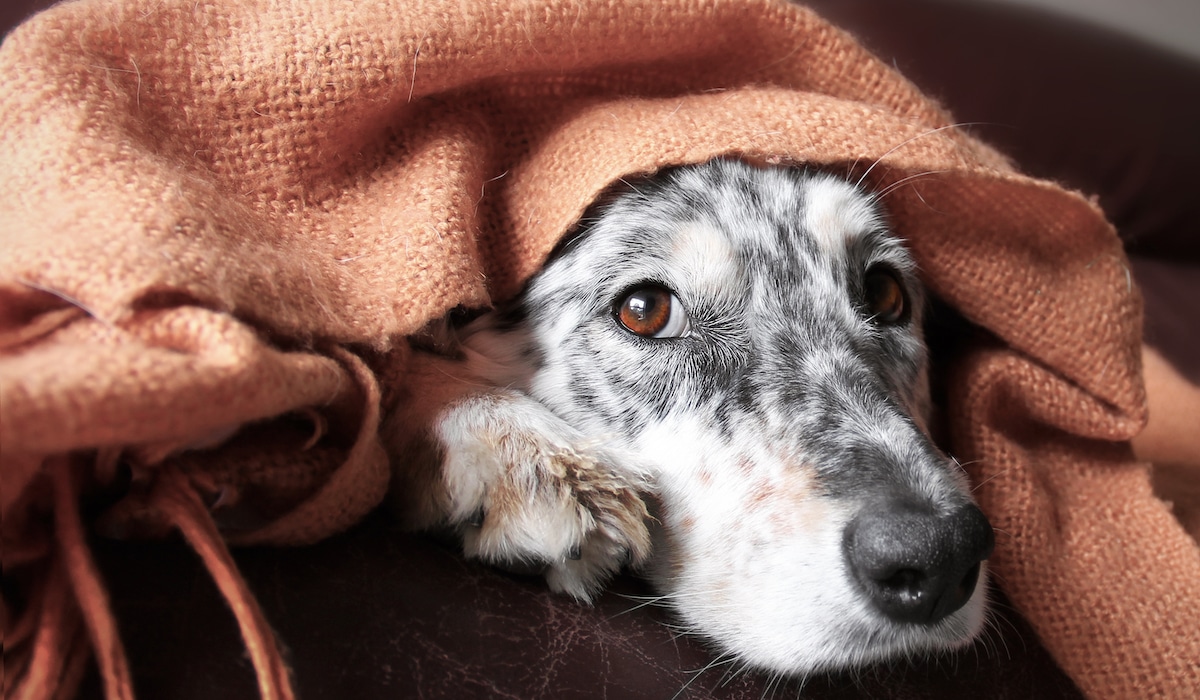Why Does My Dog Lay On Me? Top 9 Reasons
Some pups just cannot resist falling into their owner’s lap anytime it is empty. Many dogs also lay on their owners when it is time to settle in for the night, causing some pet parents to wonder why their dog needs to lay on top of them at any given chance.
Dogs will crawl on top of their owners for many reasons, ranging from their overwhelming love for you to the innate need to protect.
To help you better understand your dog’s cuddly behavior, let’s discuss the details below.

Do All Dogs Like To Lay On Top Of Their Owners?
Not all dogs will be as interested in cuddling with their owners as other dogs are. Just as each person will vary on how open they are to having other people in their space, our furry friends are no different.
Some dogs show their love for their owners in other ways, and simply enjoy having their own personal bubble.
Not only can all dogs vary in terms of their cuddliness, but some breeds are known to be more loving and attention seeking than others.
For example, some of the cuddliest dog breeds include:
- Golden Retrievers
- Yorkshire Terriers
- French Bulldogs
- Dachshunds
- Pomeranians
- Cavalier King Charles Spaniels
So if you have a dog that doesn’t like to lay on top of you or cuddle with you while they sleep, there is nothing wrong with your pup. They may just not enjoy having anyone in their personal space, no matter how much they love you.
Top 9 Reasons Why Dogs Like To Lay On Their Owners
As we mentioned above, there are many reasons why our canine companions will lay on top of their pet parents. While many of us appreciate the dog cuddles no matter the reason, it’s still wonderful to understand the factors behind this behavior.
Here are 9 reasons why your dog may like to lay on top of you.
1.) They Have A Close Bond With You

If your pup lays on top of you at any given opportunity, it may simply be because your dog loves you. A dog that is bonded to their owners may want to lay beside them each night, as well as hopping into their empty lap anytime they sit down to rest.
Dogs are also pack animals by nature, so they crave the companionship of the ones they love.
We are often our dog’s world, so it makes sense as to why they would want to snuggle up closely to us when we allow it. A dog laying on their owner may just be trying to communicate how much love is there.
2.) They Are Looking For Comfort
As we just mentioned, we are everything to our furry friends. Due to them looking up to us as the main caregivers in their lives, they will often turn to us for comfort.
This could be when they are scared, anxious, seeking warmth, lonely, and any other feeling that a dog finds overwhelming on their own.
If it seems like your dog wants to be as close as possible to you when they are looking for comfort, you may just be the one person that helps them feel safe and secure. They may lay on top of you anything they are suddenly frightened or overwhelmed, and they may also sleep closely to you each night as well.
3.) They Are Looking For Warmth

If your dog insists as being as close as possible to you on a cold night, they may just be searching for your body heat. Some dogs don’t even need the cold weather to rely on your body heat each night, as some dogs sleep colder than others.
For example, this behavior is more common in small breed dogs or those with short coats.
If your canine friend loves to sleep in a curled up position, appears a bit more clingy during winter months, or even has a hard time tolerating cold weather on walks, then they may sleep and lay on top of you in effort to warm up.
Watch for these types of behaviors so you can help your pup stay warm during those cold months and cold nights.
4.) This Is Attention Seeking Behavior
Our dog’s can’t verbalize when they want our attention, so they must turn to other attention seeking behaviors when they want our eyes on them. Laying on top of their owner could be the perfect way for your pup to gain your attention, as you have no choice but to acknowledge them when they lay on top of you.
Many dogs lay on top of their owners when they want to be pet, want to cuddle, want to play, and even when they are ready to settle down for the night and head to bed.
If it seems like your dog always lays on your lap when they are looking for attention, then they may be playing games and trying to send a message.
5.) Their Protective Instinct Is Kicking In
Does your pup always lay on you and appear to scan the room for danger?
If this is the case, their protective instincts may be kicking in. Some dogs feel like it is their duty to keep us safe, and laying on top of you may be their go to method. While there may be no real threat in or around your home, our canine companions don’t know that.
Many protective dogs will lay on their owners each time they sit down, when they sleep at night, and even when other animals are present in the room. This could be a combination of wanting to keep us safe and keeping our attention on them, as well as a bit of possessiveness.
A dog that is laying on top of their owners due to protective or possessive instincts will often remain close at all times, acting like your shadow as you move throughout the home. While this can be an endearing quality at times, it can become very frustrating as well.
6.) They Are Struggling With Separation Anxiety
A dog laying on top of their owner could be a sign of a dog with separation anxiety. Dogs engage in many attention seeking behaviors if they are struggling with being separated from their owners, even if it is just for a few hours at a time.
These pups may cling to their owners from the moment they step back into the home, often piling on top of them and adhering to them like Velcro.
Dogs can develop separation anxiety if they are left alone for long periods, lack confidence in their own skin, are adjusting to a new home, are dealing with new animals in the home, and even if they are lacking physical and mental stimulation.
This can cause them to develop a bad case of anxiety, leading to an array of frustrating canine behaviors.
Other signs of this form of canine anxiety include destructive behavior around the home, crying when forced to face alone time, being overwhelmed with excitement when their owners come home, peeing or pooping round the house, pacing, panting, and even escaping from rooms they are closed in.
Additional signs of canine separation anxiety can include, following you around the house, following you into the bathroom, your dog is acting weird, and never leaving your side.
7.) They Are Jealous Of Other Pets In the Home
If a dog is jealous of other pets in the home, they may lay on top of you in effort to show the other animals that you are “theirs”.
Some dogs will go to drastic measures to keep you to themselves and away from other furry friends, and this may include laying on you at any given chance. This often occurs when your dog sees another animal approaching you, or even when another animal is simply in the room.
If your dog lays on top of you due to jealousy or possessiveness, they may also growl at other dogs, growl when anyone comes near you, or even snap at other people that attempt to come near you.
This can actually be a dangerous behavior that you should get on top of quickly, especially if you think your other pets could be at risk because of it.
8.) Your Dog Just Likes To Cuddle With You
Many dog owners wonder if their is a deep meaning of why their dog likes to lay on them, but it may simply be due to their love of cuddling with us.
A strong bond between a dog and their owner will lead to a dog wanting to be around us as much as possible, and laying next to or on top of us when we rest can be a great way to do that. The same way children seek their parents attention and love through cuddles, some dogs are no different.
9.) You Are Enforcing The Behavior
Many dog lovers are actually enforcing the behavior when their dogs lay on top of them all the time.
Dog parents often call their furry friends over and pat at their laps, which tells the pup that you want them to come up for some cuddles. Due to how often some pet owners enforce the behavior, the dog thinks you want them to be near you at all times.
This is often the case if your dog sleeps on top of you every night as well, as you may have begun to encourage the behavior from an early age. If you asked your puppy to cuddle with you or sleep with you from the moment they entered your home, you could be the reason why they are attached to your hip all the time.
Why Does My Dog Lay On Me, But Not My Family Members?
If your dog only lays on you, but not other family members, it could just mean that they are more bonded to you.
You may be the person that brings them comfort, leading them to lay on you whenever they have the chance. This is also the case when a dog sleeps with one owner only, as many dogs prefer to rest near the person or animal that helps them feel most safe.
My Dog Always Want To Lay on Top Of Me – How Do I Limit This Behavior?
Not every dog owner will want their dog to lay on top of them or sleep with them all the time. This can be due to wanting less hair in the bed, you have a Great Dane sized dog that takes up too much room, or even simply wanting your own personal bubble.
Just as some dogs like their space, many people want their space as well.
This can lead to a pet owner looking for tips and tricks on how to encourage a dog to relax or sleep on their own bed. Luckily for these pet owners, we have a list of effective tips that we will discuss in detail below.
The most effective ways to get your dog to stop laying on top of you include:
- Address any signs of separation anxiety by tending to any stressful changes that are occurring within the home. This could mean limiting any long periods spent away, offering your dog support through any abrupt changes, socializing them with new pets in the home, and making sure they have enough exercise and mental stimulation each day.
- Seek out a professional trainer if your dog is struggling with possessiveness or aggression toward other dogs or cats in the home. Possessiveness can be really challenging to tackle on your own, so seeking professional guidance is typically best in these situations. Some breeds even have more of a protective instinct than others, so it often takes an expert to figure out how to best help your dog.
- Make sure your dog has their own bed that is cozy and inviting. If your dog knows they have a safe space to call their own, they may be more encouraged to ditch your bed and head to their cozy space.
- Make sure you are addressing any sleeping challenges with positive reinforcement training, as yelling at our punishing your dog when they want to be beside you can be confusing.
- Try not to give into their attention seeking behavior, as this will only encourage your dog to keep laying on top of you when they want your eye contact and attention on them. You can do this by simply sitting up and moving when your dog lays on you, or gently telling your dog “off” when they try to sleep on top of you at night.
- Award their good behavior with a treat when possible, as this will encourage them to do it again. For example, if your dog chooses to sleep in their own bed instead of jumping into yours (if this is not something you want), then you should award this good behavior with a tasty treat or kind praise. Just be sure to not make too big a deal out of their newfound sleeping independence, as too much excitement may call your pup over to your side. Sometimes even looking into your dog’s eyes is enough to get them up and back on top of you.
Whether you have a small puppy or a massive Great Dane, you don’t always want your pup laying on top of you at all times. Some pet owners simply need some space from their clingy canine friends, and thankfully, there are a few effective ways to encourage your dog’s independence in their resting habits.

My name is Amber. I am a dedicated animal lover that turned my passion into my career. I am a Licensed Vet Tech with 12 years of experience in veterinary medicine, but I recently took my career online to help spread accurate information on animal care. With how vast the online world is, I have a strong desire to ensure that the reader always walks away with helpful pet advice. With the experience I’ve gained from my time in this field, I have been able to travel the world, offering my services to as many animal rescues as I can find. If I am not at my laptop, or back home visiting family, you can find me somewhere in the world, cuddling every furry friend that I can find! More About Us
